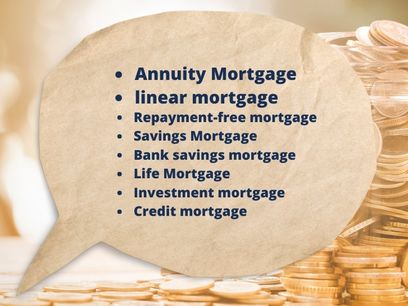An annuity mortgage is a specific type of mortgage loan where the monthly payments remain the same over the life of the loan. Each payment includes both interest and repayment of the borrowed capital. Read more about how an annuity mortgage is different from a credit mortgage, the features and the payments.
> Read more about a rental mortgage or a drawdown mortgage.
Features of an annuity mortgage
The term “annuity” refers to the fact that the total monthly payments remain the same throughout the life of the loan. Below is how an annuity mortgage works:
- Monthly payments: In an annuity mortgage, your monthly payments are calculated to remain the same throughout the life of the loan. These payments include both part of the principal (repayment of the loan) and the interest charged on the outstanding balance.
- Interest portion and repayment portion: At the beginning of the loan, the interest part of the monthly payment is usually higher, while the repayment part is lower. Over time, this changes: the interest portion decreases because it is calculated based on the remaining balance of the loan, and the repayment portion increases.
- Loan repayment: During the term of the loan, you pay regular repayments, which means that the outstanding capital is gradually reduced. This means the interest payments decrease over time, as they are calculated based on the remaining amount of the loan.
- Predictable payments: One of the advantages of an annuity mortgage is that your monthly payments are predictable. This makes it easier to manage and plan your budget because you know exactly how much you have to pay each month.
Interest and repayments of the mortgage
The total amount you pay in interest and principal is calculated to ensure the loan is fully paid off at the end of the term. At the beginning of the loan, most of the payments go towards the interest portion, but over time, more and more of each payment is allocated to the repayment portion.
Keep in mind that the actual monthly payments can vary depending on interest rates and the term of the loan. When taking out an annuity mortgage, it is important to fully understand the terms and total cost of the loan.
The terms of an annuity mortgage
The specific terms and conditions of an annuity mortgage can vary depending on the lender, region and other factors. However, here are some general aspects and conditions that often apply to an annuity mortgage:
- Maturity: This refers to the period during which you repay the mortgage loan. This can range from, say, 15, 20 to 30 years, depending on your choice and availability with the lender.
- Interest rate: The interest rate determines how much interest you pay on the loan. This can be a fixed rate, which remains constant throughout the term, or a variable rate, which can change based on fluctuations in market interest rates or another financial index.
- Monthly payments: With an annuity mortgage, your monthly payments are fixed and include both interest and repayment. At the beginning of the loan, most of your payment will go towards interest, while over time more and more will go towards repayment.
- Repayment schedule: This schedule shows how your loan will be repaid over the term. It shows how much of each monthly payment is allocated to interest and how much to repayment of the borrowed capital.
- Early repayment: Some mortgages offer the option of making additional payments to repay the loan faster. This can help reduce overall interest costs. Check if there are penalties for early repayment before doing so.
- Costs and fees: As with other loans, there may be costs and fees associated with taking out the mortgage. These can include closing costs, administration fees, mortgage insurance and more. Make sure you understand the full list of fees before agreeing to the mortgage.
- Mortgage insurance: Depending on the amount borrowed and the equity in the property, the lender may require you to take out mortgage insurance to cover their risk in case of default.
It is crucial to thoroughly understand the terms and conditions of the annuity mortgage before agreeing to it. Take the time to go through the agreement and all its documentation carefully and ask any questions you may have to the lender before signing. Read more about applying for a mortgage.
Difference between credit and annuity mortgage
A credit mortgage and an annuity mortgage are two different types of mortgage loans with different features. Here are the main differences between the two:
Retirement schedule
– Annuity mortgage: In an annuity mortgage, the monthly payments are the same throughout the life of the loan. Each payment includes both interest and repayment of the borrowed capital. As the loan progresses, the proportion of repayment in the monthly payment increases, while the proportion of interest decreases.
– Credit mortgage: A “credit mortgage” is not a common term in finance, but if you are referring to a mortgage loan or an overdraft linked to a mortgage loan, it may be different. A mortgage loan allows you to withdraw money up to a set limit and repay on an agreed schedule. It works more like a line of credit from which you can draw whenever you need it.
Monthly payments
– With an annuity mortgage, the monthly payments are the same and include both interest and repayment. These payments are predictable and remain the same throughout the term.
– In a mortgage loan, the monthly payments can be variable depending on how much you have drawn from the line of credit. You pay interest on the outstanding balance and have the flexibility to repay when you want.
Flexibility
– An annuity mortgage offers less flexibility because the monthly payments are fixed over the life of the loan.
– A mortgage loan offers more flexibility because you can withdraw and repay money according to your needs. This can be useful if you expect your financial situation to vary over time.
So the main difference is that an annuity mortgage is a structured loan where you make fixed monthly payments throughout the term, while a mortgage loan offers more flexibility in terms of withdrawals and repayments, similar to a line of credit. However, it is important to consider the specific terms and details of the product offered by a lender.
Sustainable mortgages in the Netherlands
Conditions for taking out a mortgage
Different types of mortgages
💡 Need help with finding a mortgage advisor?
We provide you with free help and advice for the best mortgage advisors.




